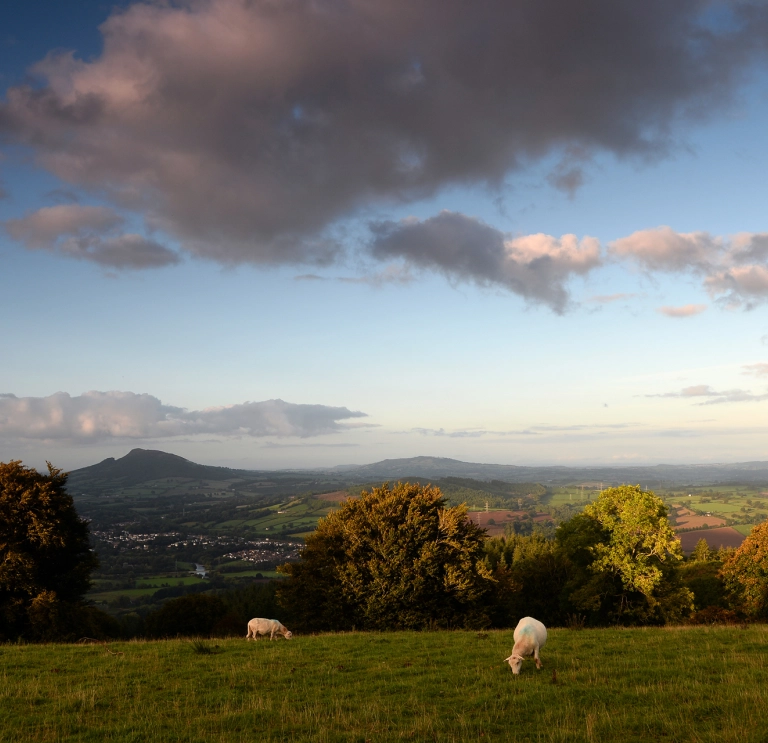10am
It’s a hazy summer’s morning in Gwenton railway station – although if we’re talking real places rather than fictional ones, I’ll admit we’re in Abergavenny. Under the shadow of the town’s Blorenge mountain, we’re listening to how a lecturer, Matthew Price, arrived here six decades ago, before returning home to his dying father, and the landscape of his past. 'He drew up at the platform, past the line of yellow lamps,' Professor Jon Anderson reads beautifully. 'A scurry of rain hit the misted glass.' Today’s field trippers circle around Anderson, soaking up the words of Raymond Williams’ novel Border Country, and its incredible power.
Welcome to Literary Atlas, a pioneering project from Cardiff University. It maps novels by Welsh authors onto the landscapes that inspired their narratives, and runs day-long field trips for keen readers. They’re wonderful things, burrowing into the real lives of the novels’ authors, their personal and political inspirations, plus they allow contributors to share their own ideas and revelations about each book along the journey. Which is continuing now on a minibus into Abergavenny town centre…
10.45am
Raymond Williams’ Border Country is a stunning, lyrical book, tracing the changes in Welsh rural life in the early 20th century – and it’s closely based on his own life. Williams’ father was a signalman on the beautiful Abergavenny to Hereford train line, just like Matthew Price’s, and Williams also went to grammar school, then to Cambridge University, against all expectations of someone from his background. Abergavenny’s Melville Arts Centre was Williams’ school, and a whole-school photograph from 1938, including him, hangs in its entrance hall. We reflect on how lovely it is that this building is still dedicated to community connections and the arts, as we take in the old Victorian stone, and feel the history in the rafters of the classrooms.
Then, Williams’ home village, in stunning rural surroundings, awaits us…
11.30am
The hamlet of Pandy lies five miles north of Abergavenny. The Black Mountains loom dramatically from its west ('mile after mile of bracken and whin and heather, of black marsh and green springy turf', Williams writes), and the Skirrid mountain rises jaggedly to its east ('the blue peak with the sudden rockfall on its western scarp'). We find the old cottage where Williams was born next to the Offa’s Dyke Path, then walk across the road to 'the river as it came towards the road, fast-flowing and stone-strewn below them', and to the moment when Matthew Price’s parents first encountered this landscape. Time stops for a moment.
Then our group walk towards a local pub for lunch along the A-road, discussing how the area has changed. This includes local people growing up at the same time as Williams, book group devotees, an American literature academic, poets and artists, and the sharing of so many stories is one of the best things about an already brilliant day.

1pm
Food for the mind is followed for all Literary Atlas participants by a free lunch (transport is provided free too). At the pub that claims to be the oldest in Wales, all ancient oak and an eerie hangman’s noose on the stairwell, we pore over what the novel has meant to each of us as we chomp on our chips, be it for reasons personal, political or poetic.
Before we go, we have a quick turn around the beautiful Grade II-listed St Michael’s Church nearby, looking at the lovely, stone tower which the young Will once climbed, seeing the 'major constellations' in the sky, and feeling 'a heightening of the quality of the valley'.
2.30pm
Then we return to Gwenton, Professor Anderson embedding this lovely territory forever in our minds.
Raymond Williams, Border CountryHe saw the extraordinary richness of colour, too brilliant really to be credible at first: the red earth, the bright green of the grass, the white walls of the houses, the white of shirt sleeves as men bent in their gardens."
Williams’ words melt away the years. 'It seemed, for a moment', he continues, 'that he was seeing it for the first time.'






